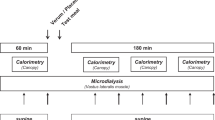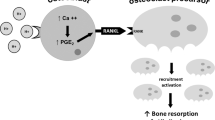Abstract
Summary
We examined whether escalating doses of potassium bicarbonate (KHCO3) supplements alter urinary nitrogen excretion expressed as a ratio to same day nitrogen intake (measure of muscle-protein breakdown). The ratio declined significantly from placebo to low to high dose of KHCO3 supplementation in older adults over 3 months, suggesting muscle-sparing.
Introduction
Neutralization of dietary acid load with alkali supplementation (i.e., KHCO3) has been hypothesized to have muscle protein-sparing effects. In controlled feeding studies with fixed nitrogen (N) intake/day, 24-h urinary N excretion is a good marker of muscle breakdown. However, in studies with self-selected diets, changes in 24-h urinary N excretion can be influenced by shifts in N intake.
Methods
We evaluated changes in 24-h total urinary N excretion as a ratio of N excretion to concurrent N intake in 233 older men and women who participated in an 84-day KHCO3 supplementation randomized placebo-controlled trial.
Results
After adjustment for relevant cofactors, escalating doses of KHCO3 (1 mmol/kg/day [low] or 1.5 mmol/kg/day [high]) resulted in a progressive decline in urinary N excretion/N intake compared to placebo (overall P for trend = 0.042). The 84-day change in urinary N excretion/N intake in the high-dose KHCO3 group was statistically significantly lower compared to placebo (P = 0.012) but not compared to the low-dose KHCO3 group (P = 0.276). The 84-day change in urinary N excretion/N intake in the low-dose KHCO3 group did not differ significantly from placebo (P = 0.145).
Conclusions
Urinary N excretion expressed as ratio to same day N intake declined steadily with increasing doses of KHCO3 supplementation from low 1 mmol/kg/day to high 1.5 mmol/kg/day, suggesting a nitrogen-sparing effect. Compared to urinary N excretion alone, this ratio could be a more reasonable measure of muscle protein metabolism in large-scale long-term human studies.
Trial registration: Clinicaltrials.gov NCT1475214

Similar content being viewed by others
References
Garibotto G, Russo R, Sofia A, Sala MR, Sabatino C, Moscatelli P, Deferrari G, Tizianello A (1996) Muscle protein turnover in chronic renal failure patients with metabolic acidosis or normal acid-base balance. Miner Electrolyte Metab 22(1–3):58–61
Williams B, Layward E, Walls J (1991) Skeletal muscle degradation and nitrogen wasting in rats with chronic metabolic acidosis. Clin Sci (Lond) 80(5):457–462
Ballmer PE, McNurlan MA, Hulter HN, Anderson SE, Garlick PJ, Krapf R (1995) Chronic metabolic acidosis decreases albumin synthesis and induces negative nitrogen balance in humans. J Clin Invest 95(1):39–45. https://doi.org/10.1172/JCI117668
Cersosimo E, Williams PE, Radosevich PM, Hoxworth BT, Lacy WW, Abumrad NN (1986) Role of glutamine in adaptations in nitrogen metabolism during fasting. Am J Phys 250(6 Pt 1):E622–E628
Frassetto L, Sebastian A (1996) Age and systemic acid-base equilibrium: analysis of published data. J Gerontol 51(1):B91–B99
Papadoyannakis NJ, Stefanidis CJ, McGeown M (1984) The effect of the correction of metabolic acidosis on nitrogen and potassium balance of patients with chronic renal failure. Am J Clin Nutr 40(3):623–627
Cesari M, Pahor M, Bartali B, Cherubini A, Penninx BW, Williams GR, Atkinson H, Martin A, Guralnik JM, Ferrucci L (2004) Antioxidants and physical performance in elderly persons: the Invecchiare in Chianti (InCHIANTI) study. Am J Clin Nutr 79(2):289–294
Houston DK, Stevens J, Cai J, Haines PS (2005) Dairy, fruit, and vegetable intakes and functional limitations and disability in a biracial cohort: the Atherosclerosis Risk in Communities Study. Am J Clin Nutr 81(2):515–522
Myint PK, Welch AA, Bingham SA, Surtees PG, Wainwright NW, Luben RN, Wareham NJ, Smith RD, Harvey IM, Day NE, Khaw KT (2007) Fruit and vegetable consumption and self-reported functional health in men and women in the European Prospective Investigation into Cancer-Norfolk (EPIC-Norfolk): a population-based cross-sectional study. Public Health Nutr 10(1):34–41. https://doi.org/10.1017/S1368980007222608
Neville CE, Young IS, Gilchrist SE, McKinley MC, Gibson A, Edgar JD, Woodside JV (2013) Effect of increased fruit and vegetable consumption on physical function and muscle strength in older adults. Age 35(6):2409–2422.https://doi.org/10.1007/s11357-013-9530-2
Kim J, Lee Y, Kye S, Chung YS, Kim KM (2015) Association of vegetables and fruits consumption with sarcopenia in older adults: the Fourth Korea National Health and Nutrition Examination Survey. Age Ageing 44(1):96–102. https://doi.org/10.1093/ageing/afu028
Dawson-Hughes B, Harris SS, Ceglia L (2008) Alkaline diets favor lean tissue mass in older adults. Am J Clin Nutr 87(3):662–665
Frassetto L, Morris RC Jr, Sebastian A (1997) Potassium bicarbonate reduces urinary nitrogen excretion in postmenopausal women. J Clin Endocrinol Metab 82(1):254–259. https://doi.org/10.1210/jcem.82.1.3663
Ceglia L, Harris SS, Abrams SA, Rasmussen HM, Dallal GE, Dawson-Hughes B (2009) Potassium bicarbonate attenuates the urinary nitrogen excretion that accompanies an increase in dietary protein and may promote calcium absorption. J Clin Endocrinol Metab 94(2):645–653. https://doi.org/10.1210/jc.2008-1796
Ceglia L, Rivas DA, Pojednic RM, Price LL, Harris SS, Smith D, Fielding RA, Dawson-Hughes B (2013) Effects of alkali supplementation and vitamin D insufficiency on rat skeletal muscle. Endocrine 44(2):454–464. https://doi.org/10.1007/s12020-013-9976-0
Chan H (1968) Adaptation of urinary nitrogen excretion in infants to changes in protein intake. Br J Nutr 22(2):315–323
Huse DM, Nelson RA, Briones ER, Hodgson PA (1974) Letter: urinary nitrogen excretion as objective measure of dietary intake. Am J Clin Nutr 27(8):771–773
Bingham SA, Cummings JH (1985) Urine nitrogen as an independent validatory measure of dietary intake: a study of nitrogen balance in individuals consuming their normal diet. Am J Clin Nutr 42(6):1276–1289
Dawson-Hughes B, Castaneda-Sceppa C, Harris SS, Palermo NJ, Cloutier G, Ceglia L, Dallal GE (2010) Impact of supplementation with bicarbonate on lower-extremity muscle performance in older men and women. Osteoporos Int 21(7):1171–1179. https://doi.org/10.1007/s00198-009-1049-0
Dawson-Hughes B, Harris SS, Palermo NJ, Gilhooly CH, Shea MK, Fielding RA, Ceglia L (2015) Potassium bicarbonate supplementation lowers bone turnover and calcium excretion in older men and women: a randomized dose-finding trial. J Bone Miner Res 30(11):2103–2111. https://doi.org/10.1002/jbmr.2554
Jorgensen K (1957) Titrimetric determination of the net excretion of acid/base in urine. Scand J Clin Lab Invest 9(3):287–291
Chan JC (1972) The rapid determination of urinary titratable acid and ammonium and evaluation of freezing as a method of preservation. Clin Biochem 5(2):94–98
Dawson-Hughes B, Harris SS, Palermo NJ, Castaneda-Sceppa C, Rasmussen HM, Dallal GE (2009) Treatment with potassium bicarbonate lowers calcium excretion and bone resorption in older men and women. J Clin Endocrinol Metab 94(1):96–102. https://doi.org/10.1210/jc.2008-1662
Acknowledgements
This study was funded by NIH/NIAMS grant number 1RO1AR060261. This material is based upon work supported by the US Department of Agriculture, under agreement No. 58-1950-0-014. Any opinions, findings, conclusions, or recommendations expressed in this publication are those of the authors and do not necessarily reflect the view of the US Department of Agriculture.
Author information
Authors and Affiliations
Corresponding author
Ethics declarations
Conflicts of interest
None.
Rights and permissions
About this article
Cite this article
Ceglia, L., Dawson-Hughes, B. Increasing alkali supplementation decreases urinary nitrogen excretion when adjusted for same day nitrogen intake. Osteoporos Int 28, 3355–3359 (2017). https://doi.org/10.1007/s00198-017-4196-8
Received:
Accepted:
Published:
Issue Date:
DOI: https://doi.org/10.1007/s00198-017-4196-8




